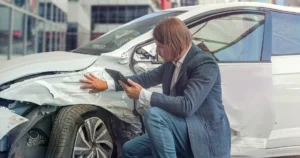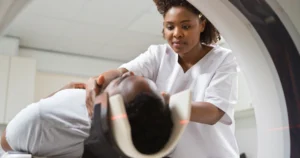 Car accidents cause more than just physical injuries,. Many crash victims may also struggle with psychological wounds, like Post-Traumatic Stress Disorder (PTSD). Indiana law recognizes that mental and emotional suffering after a crash can be just as debilitating as physical injuries, potentially entitling victims to seek compensation.
Car accidents cause more than just physical injuries,. Many crash victims may also struggle with psychological wounds, like Post-Traumatic Stress Disorder (PTSD). Indiana law recognizes that mental and emotional suffering after a crash can be just as debilitating as physical injuries, potentially entitling victims to seek compensation.
Table of Contents
- How Do Car Accidents Cause PTSD and What Are the Symptoms?
- Can Indiana Drivers Get Compensation for PTSD After a Crash?
- What Should I Do Immediately After a Crash to Support a PTSD Claim?
- Evidence That Can Provide Compelling Support for Your PTSD Claim
- Indiana’s “Impact Rule” and How It Affects Your Indiana Claim for PTSD After a Crash
- How Do Insurance Companies in South Bend Handle PTSD Claims?
- Struggling With PTSD After a Car Crash? Contact Our South Bend Law Firm Today
At Pfeifer Morgan & Stesiak, our experienced South Bend car accident attorneys are dedicated to helping countless South Bend residents secure compensation for their injuries, giving our clients the support they need to rebuild their lives after trauma.
Schedule your FREE case review today: (574) 444-0741.
How Do Car Accidents Cause PTSD and What Are the Symptoms?
Car accidents can trigger PTSD when the brain interprets the crash as a life-threatening event, releasing stress hormones that create lasting changes in how trauma is processed. The sudden, violent nature of collisions—screeching brakes, shattering glass, and the helpless feeling of losing control—can overwhelm a person’s coping mechanisms, leaving them with persistent psychological trauma long after physical injuries heal.
Common PTSD symptoms following a car accident include:
- Intrusive memories or flashbacks of the crash
- Severe anxiety when driving or riding in vehicles
- Sleep disturbances, including nightmares
- Hypervigilance on the road
- Emotional numbness or feeling detached
- Intense physical reactions to reminders (racing heartbeat, sweating)
- Avoidance behaviors (refusing to drive or avoiding accident locations)
- Mood changes, including irritability or depression
When you recognize these symptoms after a crash, seeking immediate professional help is crucial. Early intervention can prevent symptoms from worsening and strengthen your potential personal injury claim.
Can Indiana Drivers Get Compensation for PTSD After a Crash?
Yes, Indiana drivers can pursue compensation for PTSD following a car accident, as the state recognizes psychological injuries as a valid compensable damage in personal injury claims. You will need to prove that your PTSD was directly caused by the crash through medical documentation from qualified mental health professionals and demonstrate how these symptoms have impacted your daily life, work performance, and relationships.
When you file a claim for PTSD compensation, you may be eligible to recover damages for therapy expenses, psychiatric medication costs, lost wages from missed work, and pain and suffering related to your psychological trauma. However, these cases are often more challenging than claims for physical injuries alone. Highlight the necessity for skilled legal representation to successfully navigate proving psychological injuries to insurance companies and courts.
What Should I Do Immediately After a Crash to Support a PTSD Claim?
Actions taken in the hours and days following your accident can significantly strengthen your ability to recover compensation for psychological trauma.
Document Mental Health Symptoms
Record all psychological symptoms immediately after the crash, including flashbacks, nightmares, anxiety attacks, fear of driving, emotional numbness, or unusual irritability. Note their frequency, intensity, and how they interfere with your daily activities.
Seek Specialized Trauma Assessment
Consult with mental health professionals who specialize in trauma and PTSD diagnosis. Their expert evaluation creates a formal diagnosis that connects your psychological symptoms directly to the accident rather than pre-existing conditions.
Follow All Treatment Recommendations
Attend every therapy session, take prescribed medications, and complete any homework assigned by your mental health provider. Consistent treatment records demonstrate your condition’s severity and commitment to recovery.
Preserve Pre-Accident Mental Health Records
Gather records showing your psychological state before the accident to establish that your PTSD symptoms represent a change from your standard mental health, strengthening the causal connection between the crash and your trauma.
Connect With Witnesses to Emotional Changes
Collect friends, family members, or coworkers who can testify about changes in your behavior, emotional state, or functioning since the accident, providing additional verification of your invisible injuries.
Evidence That Can Provide Compelling Support for Your PTSD Claim
Building a successful PTSD claim after a car accident requires documentation that connects your psychological suffering directly to the traumatic event.
- Mental health professional diagnoses from psychologists or psychiatrists, specifically documenting PTSD symptoms and their connection to your accident
- Therapy and treatment records showing ongoing care, medication prescriptions, and professional observations about your condition
- Personal pain symptom journals detailing frequency and severity of flashbacks, nightmares, anxiety attacks, and how they disrupt daily activities
- Witness statements from family, friends, and coworkers who can testify to behavioral changes and emotional distress following the accident
- Employment records documenting missed work, reduced productivity, or accommodations needed due to psychological symptoms
- Before-and-after evidence showing your mental health status before the accident, compared to after
- Expert testimony from mental health experts explaining how car crashes commonly cause PTSD and projected the victim’s expected recovery timeline
- Medical literature supporting the connection between traumatic accidents and the development of psychological conditions
Indiana’s “Impact Rule” and How it Affects Your Indiana Claim for PTSD After a Crash
Indiana follows a modified impact rule, which requires that you suffer some physical impact during the accident to recover compensation for emotional distress, including PTSD. In car accident cases, this requirement is typically satisfied because most victims experience at least some physical contact during the collision. This physical impact may come from the seatbelt restraint, airbag deployment, or contact with the vehicle’s interior. If this impact threshold is met, victims may be eligible to pursue compensation for psychological injuries even when physical injuries are minor.
How Do Insurance Companies in South Bend Handle PTSD Claims?
Insurance companies in South Bend often approach PTSD claims with heightened scrutiny compared to physical injury claims. Challenging the severity and cause of psychological injuries, requesting extensive documentation, demanding mental health evaluations, and questioning whether your symptoms existed before the accident or stem from other life stressors.
When you pursue compensation for PTSD after a car accident, expect insurance adjusters to thoroughly investigate your mental health history, social media activity, and daily functioning for any evidence that might minimize your claim. This approach makes having experienced legal representation from Pfeifer Morgan & Stesiak crucial, as our attorneys understand local insurance company tactics and can build a comprehensive case that represents the full impact of your psychological injuries.
Struggling With PTSD After a Car Crash? Contact Our South Bend Law Firm Today
Proving PTSD after a car accident requires substantial medical evidence, expert testimony, and documentation of how this condition impacts your daily life. Negligence from another driver creates not only physical injuries but lasting psychological trauma that deserves proper compensation under Indiana law.
At Pfeifer Morgan & Stesiak, our attorneys understand the complexities of PTSD claims and work diligently to secure the maximum compensation possible for your suffering. Our team has decades of experience building powerful cases that insurance companies cannot easily dismiss. W manage every aspect of your South Bend injury claim while you focus on healing. As we accept cases on contingency, we charge you no upfront costs or fees to engage our services.
Call our office today or complete our online form for a free, confidential consultation about your PTSD claim.
Experienced Lawyers. Proven Results. Call: (574) 444-0741.












